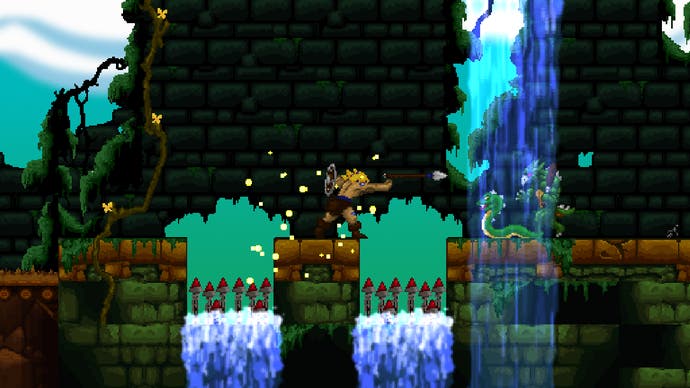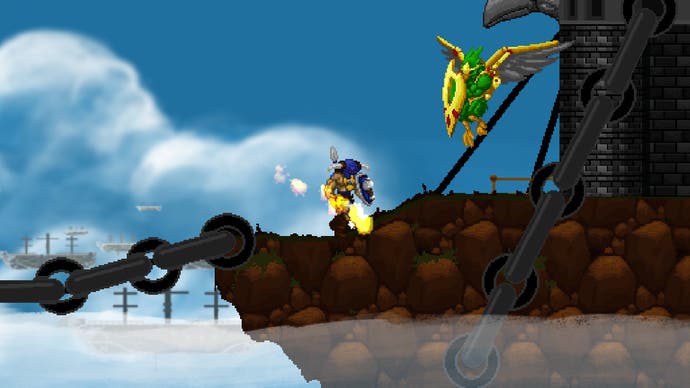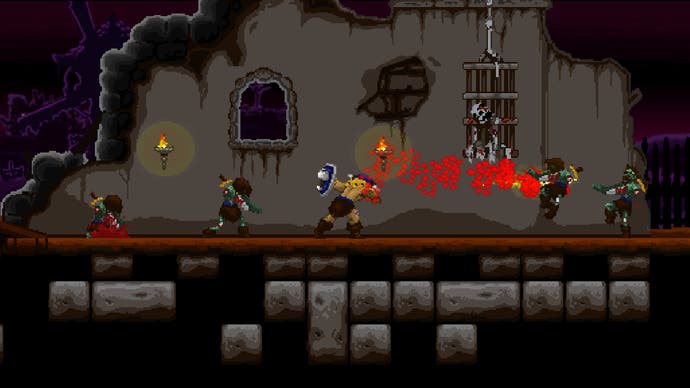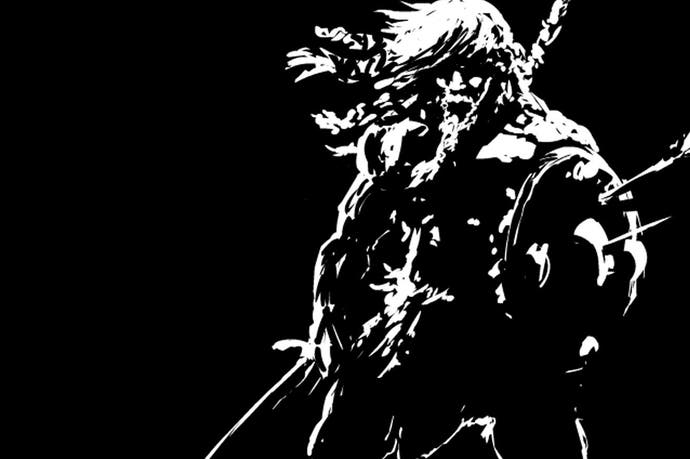Volgarr the Viking review
Thor losers.
To paraphrase the legendary Nigel Tufnell, how much retro could Volgarr the Viking be? The answer is none. None more retro.
In an indie scene where everyone and his pixel art dog is riffing on the games of the 1980s, Volgarr is the real deal. This is not retro as a surface affectation, though it captures the look to a tee, but a veritable miracle: a game that could have been deep frozen in 1987 and thawed out last week, so complete is its adherence to the way we used to play.
A side-scrolling action platformer, its ancestors will be obvious to anyone of a certain age. With its resolutely flat 2D plane of movement, it's more Ghosts N' Goblins or Rastan than Golden Axe, but there's also a heaping helping of the Bitmap Brothers classic Gods in the mix, along with Rafaelle Cecco's Stormlord.
If any of those names means anything to you, Volgarr the Viking may be the perfect game for you.
I say "may", because this is not a game that anyone will like. There's no middle ground where Volgarr is concerned. Most will hate it. A small few will love it, but they'll really love it, with a passion that burns like a thousand suns.

That's because Volgarr the Viking is hard. Hard in a way that makes even the likes of Dark Souls, with its namby pamby save points and health potions, feel like a velvet glove stroking your fevered brow.
As with all games of this ilk, your goal is no loftier than to keep moving from left to right, or right to left, until you reach the end of the level. In your way are numerous enemies, all of which exhibit virtually no AI whatsoever. They wait until you're on screen, then they head towards you with murderous intent. You can smite them with your sword, or skewer them with a thrown spear. The levels, however, are cunningly designed to make this harder than it sounds.
Swing your sword and you'll kill a basic enemy with one hit. Then you meet the ones that take two hits. Then three. That's when you realise that your sword swing has a split second blind spot that leaves you wide open. Death comes quickly in Volgarr's world. There's no health, no hit points. You start with a wooden shield. Take a hit and you lose that. Take another and you're dead. When you're dead, you start again. From the start of the level.
You can stave off this fate by opening chests. The first you open grants you a better shield, the next a helmet, the next one after that gifts you with a flaming sword. Every hit you take removes the last item, and takes you one step closer to that dreaded restart. You will fail, and you'll fail often. Each time you retrace your steps, you do so with a little more knowledge - you need to crouch here, then jump there, you can get that enemy with a spear before the other one reaches you. It's an incremental accretion of understanding, and you come to realise that far from being cruel and unfair, the game is actually a clockwork machine designed to teach you how to play, where every pixel on the screen has been meticulously placed to teach you a brutal lesson.

The combat is simple but tough, yet it only really comes into its own when it combines with the platforming. Even your jump is ruthlessly retro. There's none of this new-fangled "changing direction when jumping" here. At best, you can shift direction with a double jump, but for the most part your movement is severely constrained. As with the fighting, it starts out feeling stiff and frustrating, only to reveal itself as a near-perfect system once you accept its limitations and work within them, rather than against them.
Progress is slow, then, but utterly rewarding. You don't just celebrate each new hard-earned checkpoint, but each time you make it to a screen you've not reached before, you feel a rush of elation and achievement. Then you die, and spend fifteen minutes trying to get back there again.
Time is Volgarr's other core mechanic, since this is a game built from the ground up for the speed run community. Not only does the game demand - and reward - the sort of superhuman muscle memory that allows you to blitz through without a scratch, but there's an optional clock that starts running as soon as you start the game and won't stop until you reach the end. It's so dedicated to the pursuit of the perfect run that there's no main menu to quit back to. Once you start the game, that's it: you're in the game until the final boss, or until you give up and don't come back. At best, you can restart the current world and try again.
For those hardy few players who do excel, your reward is even greater challenges. Once you've gained all the sequential armour and gear from chests, the next ones you open will grant you tokens of light that allow you to take alternate routes, and it's only by completing the game via these that you get the true ending. Doing so means essentially beating every stage without taking a single hit. Whoever manages this deserves all the kudos in the world.

For all its ferocious nature, Volgarr somehow still manages to be enormous fun to play. There's a tactile pleasure to its chunky world, with colourful monsters that could have stepped out of an arcade cabinet, and garish bursts of pixel blood and bone that would once have been the most violent thing a gamer could witness. It may operate within the rigid framework of an older design ethos, but it's a game that flows and when you're in the groove, sailing through sections that once left you sobbing into your joypad, the thrill is hard to beat.
The game would probably benefit from being slightly friendlier in the way it sets up its challenge. There's practically no instruction, and it's only by venturing into the pause menu and control options that you'll discover vital features such as the screen zoom that lets you see what is coming up next, and the controller short cuts that make spear throws and dodge rolls easier to pull off. It's not that the game needs to blunt its claws, but it could probably do more to let you know how to avoid being scratched.
This sort of game is always tricky to recommend, because its appeal is so specific and so dependent on a willingness to suffer a hundred punishments in exchange for one sweet moment of victory, before plunging back into the fray. Make your peace with this masochistic rhythm and you'll find a game that disguises its painstakingly meticulous design behind an exterior that can seem arbitrary and clumsy. Volgarr the Viking is, beneath it all, a very lovely game. Just don't be surprised if it takes you a while to realise it.

